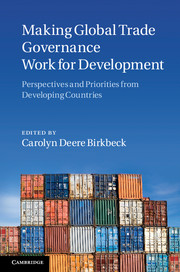 Making Global Trade Governance Work for Development
Making Global Trade Governance Work for Development Book contents
- Frontmatter
- Contents
- Figures
- Tables and boxes
- Contributors
- Acknowledgements
- Introduction
- Part I Global trade governance
- Part II Roles and responsibilities in global trade governance: diversity in developing country priorities and strategies
- Part III Strengthening multilateralism
- 10 The WTO, democracy and development: a view from the South
- 11 Reclaiming development in the world trading system (revisited): proposals for reform of WTO governance
- 12 Fostering developing country engagement in the WTO dispute settlement system
- 13 Rethinking the governance of Aid for Trade
- 14 Strengthening WTO surveillance
- 15 Why not an ombudsperson at the WTO? A proposal for debate
- Part IV Making WTO negotiations and decision-making processes fairer
- Part V Conclusion
- Index
- References
15 - Why not an ombudsperson at the WTO? A proposal for debate
from Part III - Strengthening multilateralism
Published online by Cambridge University Press: 07 September 2011
- Frontmatter
- Contents
- Figures
- Tables and boxes
- Contributors
- Acknowledgements
- Introduction
- Part I Global trade governance
- Part II Roles and responsibilities in global trade governance: diversity in developing country priorities and strategies
- Part III Strengthening multilateralism
- 10 The WTO, democracy and development: a view from the South
- 11 Reclaiming development in the world trading system (revisited): proposals for reform of WTO governance
- 12 Fostering developing country engagement in the WTO dispute settlement system
- 13 Rethinking the governance of Aid for Trade
- 14 Strengthening WTO surveillance
- 15 Why not an ombudsperson at the WTO? A proposal for debate
- Part IV Making WTO negotiations and decision-making processes fairer
- Part V Conclusion
- Index
- References
Summary
Transparency and accountability – and the participation of civil society representatives – were not the central concerns of governments when the General Agreement on Tariffs and Trade (GATT) was founded (Lacarte 2005: 447). Indeed, demands for transparency and accountability of international organizations, including non-governmental organizations, mostly emerged only in the 1990s as part of a larger debate on how to improve their performance (Blagescu et al. 2005; Coicaud and Heiskanen 2001; Dombrowski 2006; GAR 2003; Kovach et al. 2003; Lloyd 2005; Neligan 2003; Woods 2007; Woods 2008). The need for openness is now widely accepted as a way to improve not only the social legitimacy of international organizations, but also their efficacy, as measured by the capacity to fulfil their mandates. Whereas the work of GATT in its early days could be conducted at a distance from the people, this is no longer possible in this new era of the World Trade Organization (WTO).
After the experiences of the Seattle and Cancún WTO Ministerial Conferences (Aaronson 2001; Bertrand and Kalafatides 2002; Jawara and Kwa 2003), it is now difficult, if not impossible, to explain or justify either a lack of transparency or a refusal to increase accountability to citizens of the main institution of the global trading system. That said, do people have a right to know about and contribute to the work of a system that is mandated, among other goals, to contribute to the sustainable development of the country in which they live and to the preservation of the environment at the global level?
- Type
- Chapter
- Information
- Making Global Trade Governance Work for DevelopmentPerspectives and Priorities from Developing Countries, pp. 442 - 458Publisher: Cambridge University PressPrint publication year: 2011
